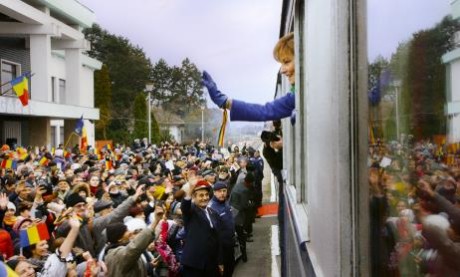


Johannes Holzhausen: The Royal Train

The daughter of King Michael 1 of Romania (who died in 2017), Princess Margareta, and her husband Radu, travel in the train of her father to meet the people and have them remember him and the good old monarchy that came to an end in 1947, when the communists took over. The train stops at small stations, where the local authorities are nervously preparing the royal welcome. Red carpet and all that. And the royal staff prepares equally how to arrive, a scenario is needed.
That’s the red thread of a film, that with humour and warmth takes the viewer to the venues of the couple in Bucharest introducing the staff that helps them to keep the memories of the monarchy and the King alive. The most important person in that respect is for me the young man, Adrian, who searches for documents and artefacts of interest for the Princess. He is a passionate monarchist searching/ hoping for the return to old times – you are a Don Quichote, an old lady says to him, if you need a Sancho Panza, I am there for you – he is the one, who visits the old ladies, who remember the King and the royalty with big love.
In scenes like that the director manages – with his flair for creative storytelling – to balance all the wonderful absurd scenes of royal protocol, like how to approach the Princess in a correct way. Three steps backwards, when you have got your diploma and then you can turn around… like if it had been the Danish queen. It’s still very much alive and popular. What is most interesting in this film is, when the old royalists remember the time, where they were not allowed to celebrate the monarchy during the time of Ceaușescu.
Austria, Germany, 2019, 90 mins.